Introduction
What is a Vegan Diet?
A vegan diet is an eating plan that excludes all animal products, including meat, dairy, eggs, and any other derivatives of animal sources. Instead, it focuses on plant-based foods such as fruits, vegetables, whole grains, legumes, nuts, and seeds. Vegans rely on these nutrient-dense plant foods to meet their dietary needs. This type of diet is rich in fiber, antioxidants, and phytonutrients—compounds found in plants that promote good health and can help protect against chronic diseases. Many people are drawn to the vegan lifestyle for ethical reasons, environmental concerns, and, increasingly, for its potential to aid in weight loss and improve overall health.
Vegan Diet for Weight Loss
Studies show that individuals on plant-based diets tend to have lower body mass indexes (BMIs) and healthier body compositions compared to those who consume animal-based products. One of the primary reasons for this is the calorie deficit created by eating nutrient-dense, low-calorie foods, which is a natural component of most vegan diets. Plant-based foods like vegetables, fruits, legumes, and whole grains are naturally lower in calories than animal products, allowing you to eat larger portions while still reducing your overall calorie intake. Additionally, plant-based diets are rich in fiber, which supports digestion, helps control hunger, and improves satiety, making it easier to stick to a calorie deficit for weight loss.
How Does the Vegan Diet Promote Weight Loss?
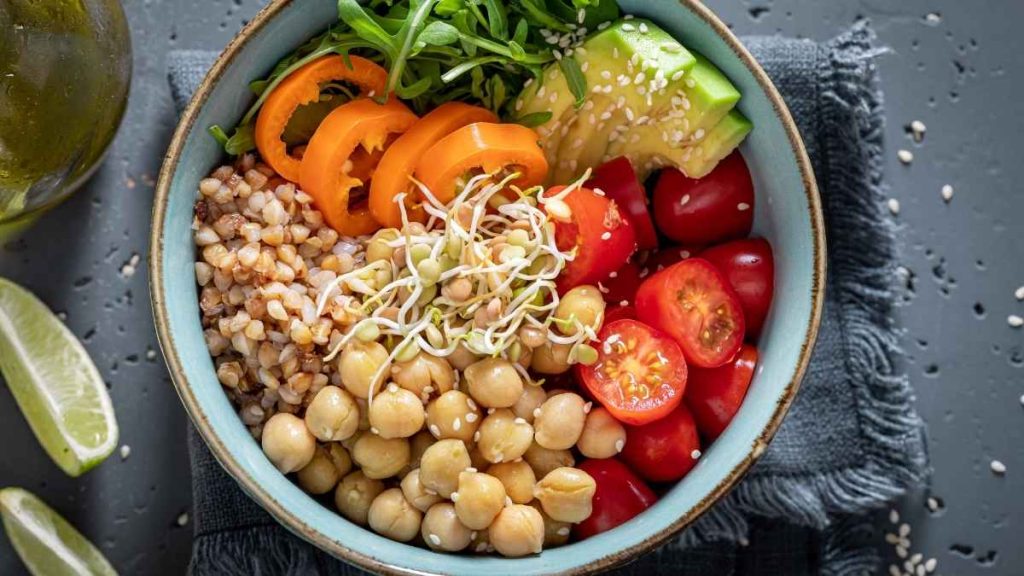
Low-Calorie Density
One of the reasons the vegan diet is effective for weight loss is its reliance on low-calorie density foods. These foods provide fewer calories per gram, which means you can eat larger quantities without consuming too many calories. For example, foods like leafy greens, broccoli, and other vegetables are high in volume but low in calories. When people consume more low-calorie density foods, they tend to feel fuller on fewer calories, which naturally supports sustainable weight loss. This makes it easier to avoid overeating and adhere to your weight loss goals.
High in Fiber
A key benefit of a vegan diet is its high fiber content. Fiber, found abundantly in fruits, vegetables, legumes, and whole grains, aids digestion and keeps you feeling full for longer periods. High-fiber foods promote a slower digestion process, which prevents blood sugar spikes and crashes that can trigger hunger pangs and cravings. For example, fiber-rich legumes like lentils and chickpeas not only add bulk to meals but also help regulate your appetite, making it easier to eat less overall. Moreover, fiber supports gut health by promoting the growth of beneficial bacteria, which is essential for maintaining a healthy metabolism.
Reduction in Saturated Fats
Vegan diets tend to be lower in unhealthy saturated fats, which are found in animal products like meat, dairy, and eggs. Consuming too much saturated fat has been linked to weight gain and an increased risk of heart disease. By eliminating animal-based foods and focusing on plant-based sources of fat, vegans often consume healthier fats from nuts, seeds, avocados, and olive oil. These fats are not only healthier but also help improve satiety and reduce the risk of overeating. Reducing saturated fat intake while increasing the consumption of heart-healthy fats is a strategy that supports both weight loss and cardiovascular health.
Vegan Diet Plan for Weight Loss
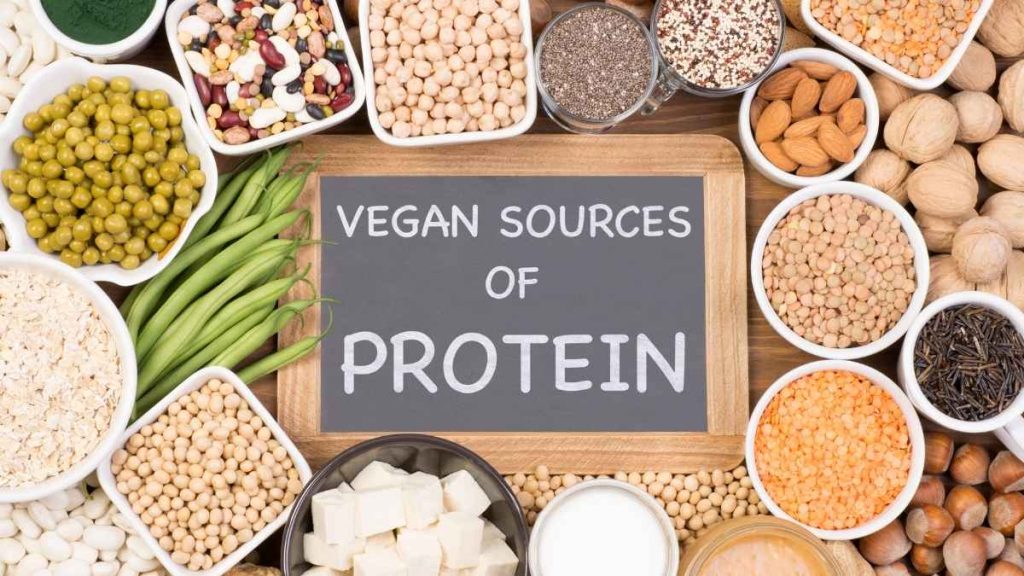
Macronutrient Breakdown
To achieve weight loss on a vegan diet, it’s important to maintain a balanced macronutrient ratio. A typical vegan weight loss diet consists of:
- 60-70% carbohydrates: Whole grains, vegetables, fruits, and legumes should make up the majority of your caloric intake. These foods provide energy and essential nutrients while being relatively low in calories.
- 10-20% protein: Plant-based proteins like beans, lentils, tofu, and tempeh should be included in meals to support muscle maintenance and metabolism.
- 20-30% healthy fats: Fats from avocados, nuts, seeds, and olive oil are important for satiety and supporting overall health.
7-Day Vegan Weight Loss Meal Plan
| Day | Breakfast | Lunch | Dinner | Snack |
| Day 1 | Smoothie with spinach, banana, almond milk, chia seeds, and peanut butter | Lentil and quinoa salad with mixed vegetables and tahini dressing | Stir-fried tofu with broccoli and brown rice | Apple slices with almond butter |
| Day 2 | Oatmeal with blueberries, flaxseeds, and almond butter | Chickpea salad wrap with mixed greens, cucumber, and tahini sauce | Sweet potato and black bean chili with avocado topping | None |
| Day 3 | Avocado toast on whole grain bread with tomato slices | Quinoa bowl with roasted vegetables and hummus | Vegan lentil curry with brown rice and steamed greens | Carrot sticks with hummus |
| Day 4 | Vegan protein shake with almond milk, banana, and spinach | Tofu stir-fry with broccoli, bell peppers, and sesame oil | Vegan pasta made from lentil noodles with marinara sauce and sautéed spinach | None |
| Day 5 | Chia seed pudding with almond milk, topped with berries | Black bean and corn salad with lime dressing | Stuffed bell peppers with quinoa, black beans, and avocado | Mixed nuts and dried fruit |
| Day 6 | Smoothie bowl with spinach, frozen berries, almond butter, and coconut flakes | Vegan wrap with falafel, hummus, and mixed greens | Stir-fried tempeh with zucchini noodles and peanut sauce | None |
| Day 7 | Whole grain cereal with almond milk and sliced banana | Kale and chickpea salad with tahini dressing | Eggplant lasagna with vegan cheese and spinach | None |
Shopping List
To get started with vegan meal prep, you’ll need to stock up on vegan essentials such as:
- Proteins: Lentils, chickpeas, black beans, tofu, tempeh.
- Whole grains: Quinoa, brown rice, oats.
- Healthy fats: Avocados, nuts, seeds, olive oil.
- Vegetables: Spinach, kale, broccoli, carrots, bell peppers.
- Fruits: Berries, bananas, apples, and other seasonal fruits.
- Plant-based milk: Almond milk, soy milk, oat milk.
Vegan Diet Chart for Weight Loss (for Fast Results)
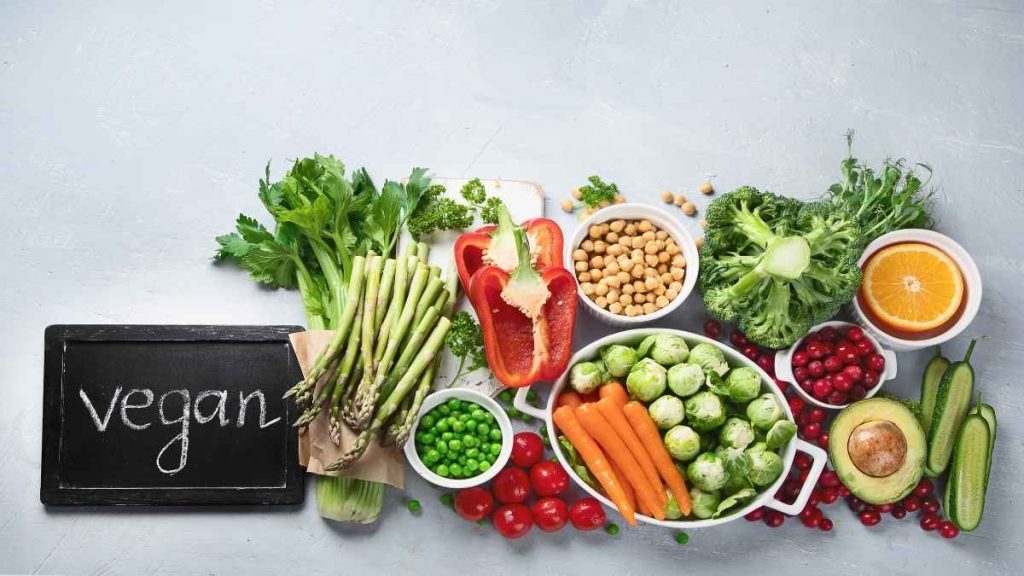
Customizing the Vegan Diet for Rapid Weight Loss
For faster weight loss on a vegan diet, focus on consuming low-calorie, high-volume foods. These are foods that provide a lot of bulk but few calories, which allows you to feel full without overeating. Foods like leafy greens, broccoli, zucchini, and cauliflower are excellent for filling your plate while staying within your calorie limits. Additionally, include lean plant-based proteins such as lentils, chickpeas, and tofu to preserve muscle mass as you lose fat.
Avoid Calorie-Dense Processed Vegan Foods
While some vegan alternatives, like vegan meats or pastries, can be convenient, they are often calorie-dense and low in nutrients. Highly processed vegan foods may be high in unhealthy fats, sugars, and additives, which can stall your weight loss progress. Focus instead on whole, unprocessed foods that are naturally low in calories but rich in nutrients.
Sample Vegan Diet Chart
- 70% Whole Carbohydrates: Include whole grains like quinoa, brown rice, and starchy vegetables like sweet potatoes.
- 20% Protein: Focus on plant-based proteins like tofu, tempeh, and beans.
- 10% Healthy Fats: Incorporate fats from avocados, olive oil, nuts, and seeds to ensure balanced nutrition.
Common Challenges on a Vegan Diet for Weight Loss (and Solutions)
Ensuring Adequate Protein Intake
One of the most common concerns for people transitioning to a vegan diet is getting enough protein. While plant-based diets provide ample protein from foods like beans, lentils, tofu, and quinoa, it may take some planning to ensure you’re getting enough. If you’re struggling to meet your protein needs, consider incorporating plant-based protein powders or protein-rich snacks like edamame and roasted chickpeas into your meals.
Avoiding Processed Vegan Foods
As mentioned, just because a food is vegan doesn’t mean it’s healthy. Many processed vegan foods contain added sugars, unhealthy fats, and high levels of sodium, which can derail weight loss efforts. Stick to whole, minimally processed foods, and read nutrition labels carefully to avoid hidden calories.
Meal Planning for Success
Planning meals in advance is one of the best ways to stay on track with a vegan diet for weight loss. When meals are prepped and ready, it’s easier to avoid impulsive eating decisions that may not align with your goals. Batch cooking, making large portions of meals that can be stored and reheated throughout the week, is a practical solution for busy individuals. It also helps prevent the temptation to grab processed or high-calorie convenience foods. Consider preparing snacks like roasted chickpeas, fruit salads, and energy bars made from nuts and seeds to have healthy options ready when hunger strikes.
Tips for Maximizing Weight Loss on a Vegan Diet
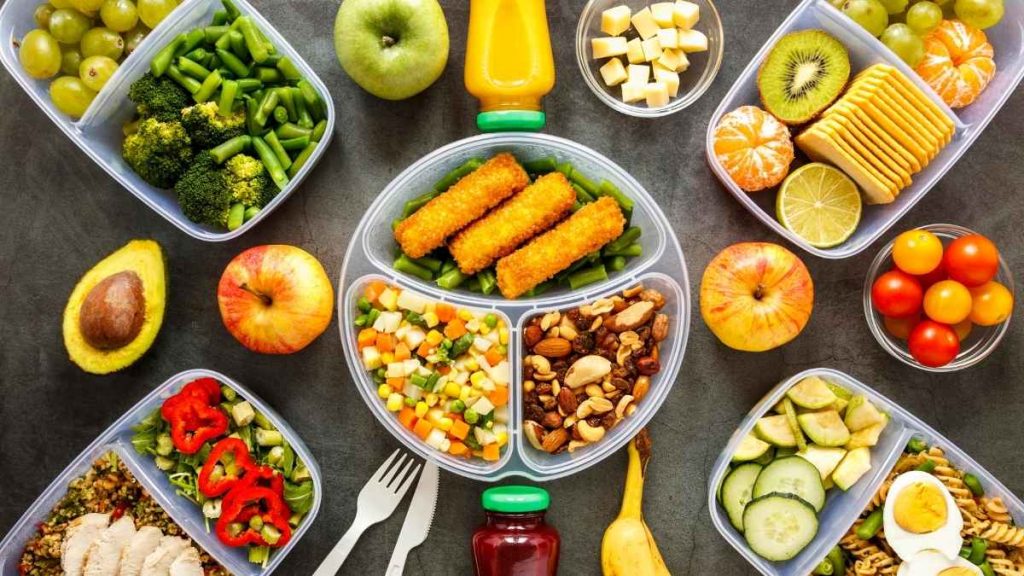
Focus on Fiber
Fiber is a secret weapon for weight loss. A high-fiber diet helps keep you feeling fuller for longer, which reduces the urge to overeat. Fiber also slows down the digestion of carbohydrates, preventing spikes in blood sugar that could lead to cravings. Foods like legumes (beans, lentils), whole grains (quinoa, oats), and vegetables (broccoli, spinach) are all excellent sources of fiber that can be easily incorporated into a vegan diet. Aim to include fiber-rich foods in every meal to help manage appetite and support digestive health.
Stay Hydrated
Drinking enough water is crucial for both overall health and weight loss. Water supports digestion, helps with the absorption of nutrients, and can reduce cravings mistaken for hunger. Drinking water before meals can also help you feel full faster, reducing the likelihood of overeating. Encourage readers to aim for at least 8 glasses of water a day. In addition to water, herbal teas or beverages without added sugars are great choices.
Exercise Regularly
Combining a vegan diet with regular physical activity can enhance fat loss and promote muscle tone. Exercise helps boost metabolism and burn extra calories, which accelerates weight loss. Encourage readers to engage in a mix of cardio exercises like running, cycling, or swimming and strength training to maintain muscle mass while losing fat. Activities like yoga and Pilates are also excellent complements to a vegan diet, as they help build core strength, flexibility, and mindfulness.
Avoid Liquid Calories
Beverages can easily add extra, unnecessary calories to your diet. Sugary drinks, sodas, fruit juices, and alcohol are often high in calories and provide little nutritional value. Instead, opt for water, unsweetened herbal teas, or black coffee. If you want something more flavorful, add a slice of lemon or cucumber to your water for a refreshing, low-calorie option.
Best Vegan Diet Tips for Fast Weight Loss
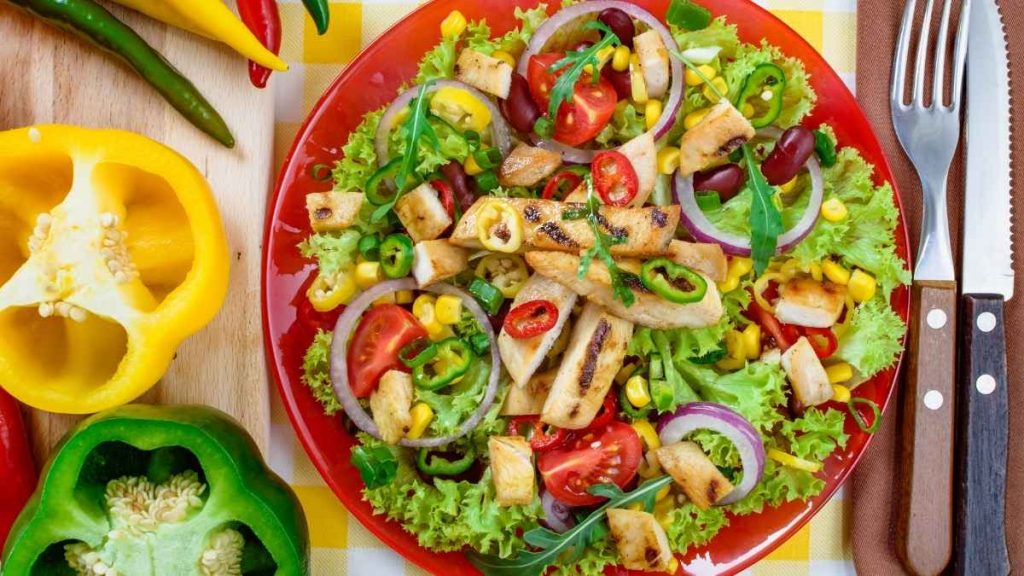
Meal Timing
One effective strategy for weight loss on a vegan diet is intermittent fasting, where meals are consumed within a specific window of time each day. For example, you might eat all your meals within an 8-hour window and fast for the remaining 16 hours. This method can help reduce overall calorie intake and enhance fat burning. However, it’s important to listen to your body and make sure you’re still consuming enough nutrients within the eating window.
Mindful Eating
Practicing mindful eating can be a powerful tool in preventing overeating. This involves paying close attention to hunger and fullness cues, eating slowly, and savoring every bite. Chewing thoroughly and focusing on the textures and flavors of your food can improve digestion and prevent eating past the point of fullness. Being more aware of your food choices and how they make you feel can help avoid overeating and ensure you’re eating only when genuinely hungry.
Incorporate High-Nutrient Foods
For optimal results, prioritize nutrient-dense foods that offer the most vitamins, minerals, and antioxidants with the fewest calories. Leafy greens like spinach, kale, and collard greens, along with brightly colored vegetables like bell peppers, carrots, and beets, are packed with essential nutrients. Berries, seeds, and nuts also offer a wealth of vitamins and minerals. Including these high-nutrient foods in your diet ensures that you’re meeting your nutritional needs while staying within your calorie limits.
Conclusion
Final Thoughts on the Vegan Diet for Weight Loss
A vegan diet can be an incredibly effective way to achieve and maintain weight loss, provided it’s done correctly. By focusing on whole, plant-based foods and avoiding processed alternatives, individuals can create a calorie deficit while still enjoying a variety of nutrient-dense, satisfying meals. Additionally, the natural fiber and low-calorie density of plant-based foods help promote satiety and long-term weight management. The reduction of unhealthy saturated fats and an increase in heart-healthy fats further support overall health.
Encouragement to Start
Adopting a vegan diet is not only beneficial for weight loss but also offers numerous health advantages, including improved heart health, better digestion, and even a lower risk of certain chronic diseases. It’s a diet that aligns with ethical and environmental values while promoting personal well-being. If you’re looking to lose weight and improve your overall health, a vegan diet could be the perfect solution. With proper meal planning, focus on nutrient-rich foods, and commitment to your goals, you can succeed on your vegan weight loss journey.